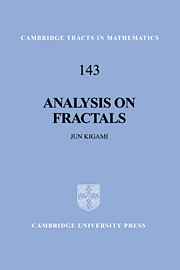Book contents
- Frontmatter
- Contents
- Introduction
- 1 Geometry of Self-Similar Sets
- 2 Analysis on Limits of Networks
- 3 Construction of Laplacians on P. C. F. Self-Similar Structures
- 4 Eigenvalues and Eigenfunctions of Laplacians
- 5 Heat Kernels
- Appendix A Additional Facts
- Appendix B Mathematical Background
- Bibliography
- Index of Notation
- Index
3 - Construction of Laplacians on P. C. F. Self-Similar Structures
Published online by Cambridge University Press: 22 September 2009
- Frontmatter
- Contents
- Introduction
- 1 Geometry of Self-Similar Sets
- 2 Analysis on Limits of Networks
- 3 Construction of Laplacians on P. C. F. Self-Similar Structures
- 4 Eigenvalues and Eigenfunctions of Laplacians
- 5 Heat Kernels
- Appendix A Additional Facts
- Appendix B Mathematical Background
- Bibliography
- Index of Notation
- Index
Summary
In this chapter, we will construct the analysis associated with Laplacians on connected post critically finite self-similar structures. In this chapter, L = (K, S, {Fi} i∊S) is a post critically finite (p. c. f. for short) self-similar structure and K is assumed to be connected. (Also in this chapter, we always set S = {1,2, …, N }.) Recall that a condition for K being connected was given in 1.6.
The key idea of constructing a Laplacian (or a Dirichlet form) on K is finding a “self-similar” compatible sequence of r-networks on {Vm } m≥0, where Vm = Vm(L) was defined in Lemma 1.3.11. Note that {Vm } m≥0 is a monotone increasing sequence of finite sets. We will formulate such a self-similar compatible sequence in 3.1. Once we get such a sequence, we can use the general theory in the last chapter and construct a resistance form (ℇ, F) and a resistance metric R on V∗, where V>∗ = Um≥0 Vm.
If the closure of V* with respect to the metric R were always identified with K, then we could apply Theorem 2.4.2 and see that (ℇ, F) is a regular local Dirichlet form on L2 (K, μ) for any self-similar measure μ on K. Consequently, we could immediately obtain a Laplacian associated with the Dirichlet form (ℇ, F) on L2(K, μ).
- Type
- Chapter
- Information
- Analysis on Fractals , pp. 68 - 130Publisher: Cambridge University PressPrint publication year: 2001

